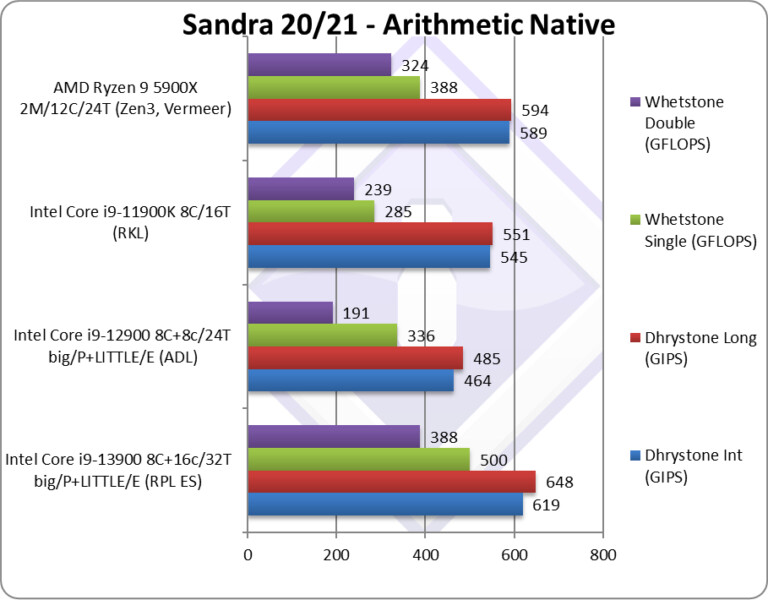TheLostSwede
News Editor
- Joined
- Nov 11, 2004
- Messages
- 17,758 (2.42/day)
- Location
- Sweden
| System Name | Overlord Mk MLI |
|---|---|
| Processor | AMD Ryzen 7 7800X3D |
| Motherboard | Gigabyte X670E Aorus Master |
| Cooling | Noctua NH-D15 SE with offsets |
| Memory | 32GB Team T-Create Expert DDR5 6000 MHz @ CL30-34-34-68 |
| Video Card(s) | Gainward GeForce RTX 4080 Phantom GS |
| Storage | 1TB Solidigm P44 Pro, 2 TB Corsair MP600 Pro, 2TB Kingston KC3000 |
| Display(s) | Acer XV272K LVbmiipruzx 4K@160Hz |
| Case | Fractal Design Torrent Compact |
| Audio Device(s) | Corsair Virtuoso SE |
| Power Supply | be quiet! Pure Power 12 M 850 W |
| Mouse | Logitech G502 Lightspeed |
| Keyboard | Corsair K70 Max |
| Software | Windows 10 Pro |
| Benchmark Scores | https://valid.x86.fr/yfsd9w |
The first reliable benchmark figures of AMD's Ryzen 7000-series CPUs have arrived, courtesy of SiSoftware. The benchmark suite software developer has released benchmark figures for the Ryzen 5 7600X and Ryzen 9 7950X. Keep in mind that these benchmarks are limited to the different tests in SiSoftware Sandra. Also note that the graphs for the Ryzen 5 7600X have typos, as the SiSoftware wrote Ryzen 5 7760X instead of 7600X and the Core i5-12600K is listed as a Core i7 CPU. Starting with the 7600X, the CPU appears to perform similar to, or slightly slower than the Intel Core i5-12600K in the arithmetic tests. On the other hand, it handily crushes the older Ryzen 5 5600X in every test here, by somewhere between 17 and 36 percent depending on the test.
Moving on to the vector SIMD tests, AMD's Zen 4 architecture shows much greater performance improvements, beating the Intel Core i5-12600K in all but one of the tests, where it loses by a fairly small margin. Here it beats the Ryzen 5 5600X by anything from 28 to a massive 86 percent. Where AMD's Zen 4 architecture really kicks things up a notch is in the image processing test, at least compared to the Zen 3 architecture, thanks to its AVX512 capabilities. As such, it's over twice as fast in many of the tests, but it still loses out in half of the tests to Intel's Core i5-12600K. AMD has also improved the inter-thread/core latency in the same module, by a not insignificant amount. Where the Ryzen 5 7600X doesn't fare so well is when it comes to performance vs. power, largely due to the fact that AMD moved the TDP from 65 to 105 W, but it still offers better performance per Watt than Intel's current models.
Update 17:31 UTC: Updated with the Ryzen 7 7700X results.
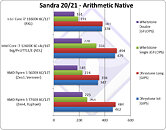
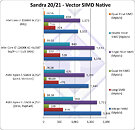
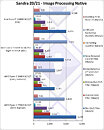
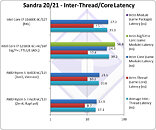
Moving on to the Ryzen 9 7950X things are looking a lot more impressive, beating all the current competition by quite some margin. On average in the arithmetic test, the Ryzen 9 7950X beats its predecessor by anywhere from 30 to 45 percent, with the Intel Core i9-12900K falling even further behind. The latter wasn't unexpected, as the Ryzen 9 5950X was already beating it in this test. In the vector SIMD tests we're seeing similar results, with the Ryzen 9 7950X outclassing the competition by an average of 60 percent improved performance. Things are looking even better in the image processing test, with the Ryzen 9 7950X being twice as fast or faster than the Ryzen 9 5950X, in five out of eight tests. It does lose out to the Intel Core i9-12900K in one of the tests by a fair margin, but beats it in most of the other tests by an equally fair or sometimes even bigger margin.
As with the Ryzen 6 7600X, the inter-thread/core latency has been improved, but the inter-module latency has increased by almost 10 ns versus the Ryzen 9 5950X in SiSoftware's tests. Thanks to its huge overall increase in performance, the performance vs. power efficiency improves over the Ryzen 9 5950X, even though it's only by seven percent, once again thanks to AMD's change in TDP levels, this time from 142 to 230 Watt. It'll be interesting to see how Intel's 13th generation of Core i processors will compare, but based on the SiSoftware numbers, the Ryzen 9 7950X looks like it's going to be a performance beast when it comes to multitasking applications.
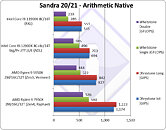
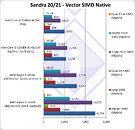
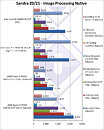
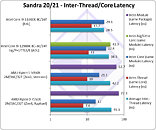
As SiSoftware had also tested the Ryzen 7 7700X, we thought it only prudent to add the results of the same tests that we did for the other two CPUs. It seems to be on par with Intel's Core i7-12700K in the arithmetic tests, but outperforms it with a reasonable margin in all of the vector SIMD tests. In the image processing tests it's some wins, some losses, but overall among all the tests, AMD comes out slightly on top of Intel. As the Ryzen 7 7700X is still a 105 W part, it performs the best in SiSoftwares performance vs. power comparison, being 39 percent more power efficient than the Ryzen 7 5800X.
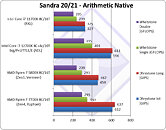
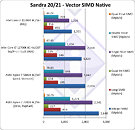
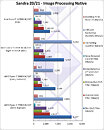
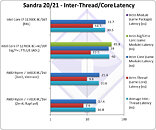
View at TechPowerUp Main Site | Source
Moving on to the vector SIMD tests, AMD's Zen 4 architecture shows much greater performance improvements, beating the Intel Core i5-12600K in all but one of the tests, where it loses by a fairly small margin. Here it beats the Ryzen 5 5600X by anything from 28 to a massive 86 percent. Where AMD's Zen 4 architecture really kicks things up a notch is in the image processing test, at least compared to the Zen 3 architecture, thanks to its AVX512 capabilities. As such, it's over twice as fast in many of the tests, but it still loses out in half of the tests to Intel's Core i5-12600K. AMD has also improved the inter-thread/core latency in the same module, by a not insignificant amount. Where the Ryzen 5 7600X doesn't fare so well is when it comes to performance vs. power, largely due to the fact that AMD moved the TDP from 65 to 105 W, but it still offers better performance per Watt than Intel's current models.
Update 17:31 UTC: Updated with the Ryzen 7 7700X results.




Moving on to the Ryzen 9 7950X things are looking a lot more impressive, beating all the current competition by quite some margin. On average in the arithmetic test, the Ryzen 9 7950X beats its predecessor by anywhere from 30 to 45 percent, with the Intel Core i9-12900K falling even further behind. The latter wasn't unexpected, as the Ryzen 9 5950X was already beating it in this test. In the vector SIMD tests we're seeing similar results, with the Ryzen 9 7950X outclassing the competition by an average of 60 percent improved performance. Things are looking even better in the image processing test, with the Ryzen 9 7950X being twice as fast or faster than the Ryzen 9 5950X, in five out of eight tests. It does lose out to the Intel Core i9-12900K in one of the tests by a fair margin, but beats it in most of the other tests by an equally fair or sometimes even bigger margin.
As with the Ryzen 6 7600X, the inter-thread/core latency has been improved, but the inter-module latency has increased by almost 10 ns versus the Ryzen 9 5950X in SiSoftware's tests. Thanks to its huge overall increase in performance, the performance vs. power efficiency improves over the Ryzen 9 5950X, even though it's only by seven percent, once again thanks to AMD's change in TDP levels, this time from 142 to 230 Watt. It'll be interesting to see how Intel's 13th generation of Core i processors will compare, but based on the SiSoftware numbers, the Ryzen 9 7950X looks like it's going to be a performance beast when it comes to multitasking applications.




As SiSoftware had also tested the Ryzen 7 7700X, we thought it only prudent to add the results of the same tests that we did for the other two CPUs. It seems to be on par with Intel's Core i7-12700K in the arithmetic tests, but outperforms it with a reasonable margin in all of the vector SIMD tests. In the image processing tests it's some wins, some losses, but overall among all the tests, AMD comes out slightly on top of Intel. As the Ryzen 7 7700X is still a 105 W part, it performs the best in SiSoftwares performance vs. power comparison, being 39 percent more power efficient than the Ryzen 7 5800X.




View at TechPowerUp Main Site | Source

